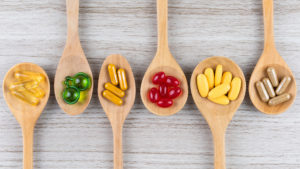Women’s Multivitamins
 With the increased consumption of processed foods, we lose many of the nutrients necessary for our overall health. A large number of women turn to dietary supplements and multivitamins to make up for what they are not getting via their diet. The effort required for a healthy and balanced diet is sometimes too much to be accommodated through the rapid tempo of daily life, so even though women could get a lot of the necessary nutrients through food this is not always realistic. Vitamins, multivitamins and mineral supplements, are especially helpful for the following categories:
With the increased consumption of processed foods, we lose many of the nutrients necessary for our overall health. A large number of women turn to dietary supplements and multivitamins to make up for what they are not getting via their diet. The effort required for a healthy and balanced diet is sometimes too much to be accommodated through the rapid tempo of daily life, so even though women could get a lot of the necessary nutrients through food this is not always realistic. Vitamins, multivitamins and mineral supplements, are especially helpful for the following categories:
- Women who are or may become pregnant: to lower the risk of birth defects, pregnant women should have a daily intake of at least 400 micrograms of folic acid.
- Postmenopausal women: due to hormonal changes after menopause, women tend to lose bone density at a faster rate—especially when compared to men. Calcium and vitamin D are optimal to prevent osteoporosis, and they are not adequately provided through nutrition. A supplement that includes those, along with B-12 and weight exercises will help prevent osteoporosis and any associated health problems.
- Vegetarians: the consumption of plant products and vegetables may mean that women who follow a vegetarian diet are more in need of vitamins generally found in animal products. Most commonly, vitamins B-12 and B-2, as well as vitamin D lack in vegetarian, and especially vegan, diets.
Though it is easy to turn to dietary supplements and minerals to make up for the low levels of these vitamins in food, it is not impossible to make dietary choices that provide you with the necessary nutrients. These are some of the foods that contain important vitamins and minerals for your health, though you should always listen to your body and consult your health care provider if you make major dietary changes or are experiencing health challenges:
- Vitamin B9 (folic acid): spinach and other dark green leafy vegetables, oranges, pure orange juice, nuts, beans, chicken, lean beef, whole grains, and cereals with added folic acid
- Vitamin B-12: low-fat or fat-free milk, eggs, liver, poultry, clams, sardines, flounder, herring, blue cheese, and nutritional yeast. It may also be found in food that have B-12 added, such as cereal, fortified soy beverages, and veggie burgers.
- Vitamin D: tuna, salmon, and fortified foods
- Calcium: low-fat or fat-free yogurt, cheese, and milk. Dark green leafy vegetables and canned salmon make good sources of calcium as well. It’s found in calcium-added foods such as select soy beverages, 100% orange juice, tofu, and cereals.
- Iron: lean red meats and chicken, seafood, cereals/breads with added iron, oysters, beans, dark chocolate, liver, spinach, tofu, and canned tomatoes.
